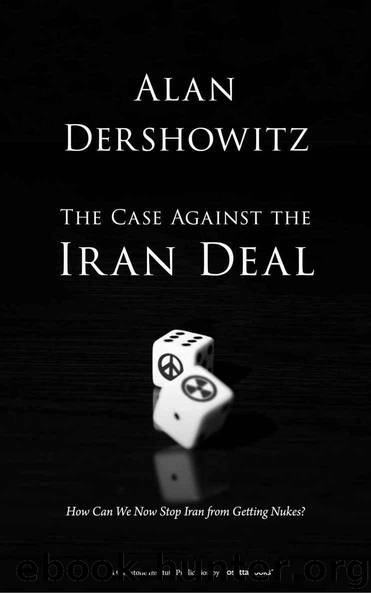The Case Against the Iran Deal: How Can We Now Stop Iran from Getting Nukes? by Alan Dershowitz

Author:Alan Dershowitz
Language: eng
Format: mobi
Publisher: RosettaBooks
Published: 2015-07-28T22:00:00+00:00
D. Oppose the Deal on Iran123
The deal that has been offered to Iran—to soften some sanctions in return for a promise by the mullahs to preserve the status quo with regard to their nuclear program—does not serve the interest of peace. This is not to discourage further diplomacy and negotiations, but it is to underline what Secretary of State John Kerry has said: namely that a bad deal is worse than no deal. This is a very bad deal for America, its allies, and peace.
Diplomacy is better than war, but bad diplomacy can cause bad wars. The US is leading the noble efforts, stalled for the moment, to achieve a diplomatic breakthrough in our determination to prevent Iran from developing, or having the capacity to develop, nuclear weapons. There is little dispute about this essential goal: virtually everyone agrees that a nuclear armed Iran would pose unacceptably grave dangers to the United States and its allies.
Nor is there much controversy over the preference for “jaw jaw” over “war war” as Winston Churchill once put it. But the understandable concern, expressed by Israeli, French, Saudi, and some other leaders, is that the Iranian leadership is playing for time—that they want to make insignificant concessions in exchange for significant reductions in the sanctions that are crippling their economy. Their goal is to have their yellow cake and eat good food at the same time. These leaders, and many experienced nuclear and diplomatic experts, fear that a bad deal, such as the one that Secretary Kerry seemed ready to accept, would allow the Iranians to inch closer to nuclear weapons capacity while strengthening their faltering economy. The net result would be a more powerful Iran with the ability to deploy a nuclear arsenal quickly and surreptitiously.
Were this to occur, we would be witnessing a recurrence of the failed efforts to prevent a nuclear North Korea but in a far more volatile and dangerous neighborhood of the globe. Were Iran to use the current diplomatic efforts as a cover to buy time to make a preventive military attack unrealistic, this would indeed be our “Chamberlain moment,” a replication of the time three-quarters of a century ago when the idealistic but naive British prime minister made a bad deal with the Nazis in a desperate but futile effort to avoid deploying the military option against Hitler’s growing power.
Winston Churchill, despite his preference for jaw, railed against Chamberlain’s concession, describing it as a defeat without a war. The war, of course, soon came, and the allies were in a weaker position, having ceded the industrially and militarily critical Sudetenland to Germany while at the same time giving it more time to enhance its military power. The result was tens of millions of deaths that might have been avoided if the British and French had engaged in a preventive war instead of giving dangerous concessions to the Nazis when they were still weak.
The immediate choice for the world today is not between diplomacy and preventive war, as it may have been in 1938.
Download
This site does not store any files on its server. We only index and link to content provided by other sites. Please contact the content providers to delete copyright contents if any and email us, we'll remove relevant links or contents immediately.
| Arms Control | Diplomacy |
| Security | Trades & Tariffs |
| Treaties | African |
| Asian | Australian & Oceanian |
| Canadian | Caribbean & Latin American |
| European | Middle Eastern |
| Russian & Former Soviet Union |
The Secret History by Donna Tartt(16627)
The Social Justice Warrior Handbook by Lisa De Pasquale(11489)
Thirteen Reasons Why by Jay Asher(7788)
This Is How You Lose Her by Junot Diaz(5774)
Weapons of Math Destruction by Cathy O'Neil(5038)
Zero to One by Peter Thiel(4824)
The Myth of the Strong Leader by Archie Brown(4789)
Promise Me, Dad by Joe Biden(4449)
Beartown by Fredrik Backman(4419)
Stone's Rules by Roger Stone(4416)
How Democracies Die by Steven Levitsky & Daniel Ziblatt(4399)
The Fire Next Time by James Baldwin(4343)
100 Deadly Skills by Clint Emerson(4079)
A Higher Loyalty: Truth, Lies, and Leadership by James Comey(4033)
Rise and Kill First by Ronen Bergman(4012)
The David Icke Guide to the Global Conspiracy (and how to end it) by David Icke(3883)
The Farm by Tom Rob Smith(3872)
Secrecy World by Jake Bernstein(3783)
The Doomsday Machine by Daniel Ellsberg(3731)
